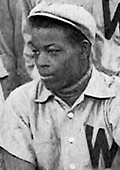
|
During the late 1800s and early 1900s, a young man from Wooster, Ohio, would become a trailblazer, though he may not have even realized the significance of what he was doing at the time. Charles Follis, who eventually became the first African-American professional football player, simply wanted to play sports.
After not only helping organize Wooster High School’s first football team (the home stadium is now named Follis Field), but being elected team captain by his white schoolmates and starring at halfback, Follis played baseball for the then-University of Wooster for parts of the 1901 and 1902 seasons.
According to Ed Arn’s research and published in his book, “Black & Gold: A History of Athletics, The College of Wooster, 1870-1945,” Follis batted leadoff and played catcher in the opener of the three-game 1901 campaign (0-3). The team improved dramatically in 1902 (6-2), with Follis credited for a double and a triple against Ohio State University, two hits versus Kenyon College, and three hits against Ohio Wesleyan University, all Wooster wins.
The 1903 Index noted that Follis “played the game as he can only play it and has placed a quietus on all base stealing.”
Another source (Black Sports, Nov. 1975) described Follis’s baseball exploits “as the talk of the Ohio college circuit,” as he was “credited with many stolen bases, double plays, and even two triple plays in his career, but these skills had to rank second to his reputation as a power hitter.”
Follis’s time on the hill was short, as he went on to play for a variety of other baseball teams in the loosely organized leagues of the day, but it was valuable as Ohio Wesleyan’s Branch Rickey, “his closest competitor for top catching honors among the Ohio colleges,” took notice.
Rickey, of course, would make history much later (1945) when as an executive of the Brooklyn Dodgers, he broke Major League Baseball’s color barrier with the signing of Jackie Robinson, and some historians believe it was Rickey’s early connection with Follis that played a significant role influencing that decision.
In addition to baseball, the two were also gridiron rivals briefly. Follis never played football for the University, rather the amateur Wooster Athletic Association, and there was a two-game series in 1901 between Wooster A.A. and the Shelby Athletic Club, which often fielded Rickey as a player. Even though, Shelby won both games, Follis was so impressive that the manager for Shelby, F.C. Schiffer, recruited him.
Schiffer “secured” Follis for Shelby in the 1902 and 1903 seasons, and the Wooster product didn’t disappoint with several long runs and “his defensive work was also cited.” While it’s not clear whether he was a professional those seasons, in the Sept. 16, 1904, edition of the Shelby Daily Globe, the headline read, “Charles Follis has signed for the season,” certifying him as the first African-American professional football player.
Follis celebrated his “contract” with an 83-yard touchdown run in the 1904 opener, and “his steady play was largely responsible for an 8-1-1 record.” He continued to star for Shelby in 1905, however in 1906, injuries started to take their toll, and “he limped off the field for the last time on Thanksgiving Day.”
Unfortunately, Follis died shortly thereafter (1910) at the young age of 31 from pneumonia, but his legacy still carries on as a racial pioneer. The Professional Football Hall of Fame in Canton has a plaque with his name on it recognizing him as the first Black professional football player, and a production about Follis’s life took place this past summer at Malabar Farm State Park, near Mansfield. It was called “The Black Cyclone,” after Follis’s nickname.

